BUDDHISM/ BRAHMA/COMPLICATIONS FOR ALL
×

What does Buddhism say about the idea of God? Best answer: ‘it’s complicated.” Are Buddhists theists, atheists or non-theists? Does it even matter?
Feature Contents
Do Buddhists believe in God? What does Buddhism teach about the idea of God?
Many people, not familiar with Buddhist thought, assume that the label of “religion” means Buddhists must believe in some type of God. There’s the opposite nihilistic extreme — those who have studied a little about Buddhism — and assume that the Dharma of Buddha is atheistic or non-theistic. Neither concept is right or wrong.
Feature by Lee Clarke
NOTE: Feature is the point-of-view of the author.
There are many views on this topic. Citations included.

Part of the problem, of course, labels. Buddhism has a lot more to say on labels and imputing concepts than it does about gods and deities — and “religion” is clearly a problematic label.
The Buddhist path embraces everyone, regardless of any belief in God — or not. Atheists Buddhists, Christians, shamans, pagans, agnostics, or “undecideds” can all equally practice the Buddha’s teachings. Whether your concept of God is an all-powerful, all-knowing “capital G” God, or a less defined concept of universal consciousness, or a nature deity, or the more practical “meditational deity” — Buddhism welcomes all of these equally. [Note: We’re speaking about Buddhism generally; there are some schools, however, which have stricter ideas on divinities, beyond the scope of this story.]
What did Buddha say?
So, what did Buddha actually say about divine beings? Buddha lived in a time totally different from our own — a time in which belief in Gods and divine interventions was incredibly natural and universal.
It is clear from many Buddhist suttas (sutras) — supported by the views of many scholars — that the Buddha did not deny the gods. When he did mention them, they seemed unimportant. He matter-of-factly described them, as he might talk about an ordinary person. On the other hand, he did NOT criticize them, or any other belief. It is clear from various sutta references that he viewed gods as sentient beings trapped in the same cycle of Samsara and suffering as human beings.
https://googleads.g.doubleclick.net/pagead/ads?gdpr=0&client=ca-pub-3878543860036370&output=html&h=280&adk=1194935637&adf=3360493835&pi=t.aa~a.4194215718~i.22~rp.4&w=693&abgtt=6&fwrn=4&fwrnh=100&lmt=1747262247&num_ads=1&rafmt=1&armr=3&sem=mc&pwprc=5779492849&ad_type=text_image&format=693×280&url=https%3A%2F%2Fbuddhaweekly.com%2Fwhat-does-buddhism-say-about-the-idea-of-god-best-answer-its-complicated-are-buddhists-theists-atheists-or-non-theists-does-it-even-matter%2F&fwr=0&pra=3&rh=174&rw=693&rpe=1&resp_fmts=3&wgl=1&fa=27&uach=WyJXaW5kb3dzIiwiMTAuMC4wIiwieDg2IiwiIiwiMTM2LjAuMzI0MC42NCIsbnVsbCwwLG51bGwsIjY0IixbWyJDaHJvbWl1bSIsIjEzNi4wLjcxMDMuOTMiXSxbIk1pY3Jvc29mdCBFZGdlIiwiMTM2LjAuMzI0MC42NCJdLFsiTm90LkEvQnJhbmQiLCI5OS4wLjAuMCJdXSwwXQ..&dt=1747264340502&bpp=9&bdt=2931&idt=-M&shv=r20250514&mjsv=m202505130101&ptt=9&saldr=aa&abxe=1&cookie_enabled=1&eoidce=1&prev_fmts=0x0&nras=2&correlator=4977450786059&frm=20&pv=1&u_tz=-300&u_his=2&u_h=900&u_w=1600&u_ah=860&u_aw=1600&u_cd=24&u_sd=1&dmc=8&adx=299&ady=1729&biw=1537&bih=752&scr_x=0&scr_y=0&eid=31092192%2C31092369%2C95353387%2C95360815%2C31092448%2C95360957&oid=2&pvsid=4013715863223452&tmod=475939233&wsm=1&uas=0&nvt=1&ref=https%3A%2F%2Fwww.bing.com%2F&fc=1408&brdim=0%2C0%2C0%2C0%2C1600%2C0%2C1600%2C860%2C1552%2C752&vis=1&rsz=%7C%7Cs%7C&abl=NS&fu=128&bc=31&bz=1.03&td=1&tdf=2&psd=W251bGwsbnVsbCxudWxsLDNd&nt=1&pgls=CAEaBTYuOC4x&ifi=2&uci=a!2&btvi=1&fsb=1&dtd=120
Karen Armstrong, a well-known scholar of religion explains:
“The Buddha believed implicitly in the existence of the Gods since they were a part of his cultural baggage, but he didn’t believe them to be much use to mankind. They too were caught up in the world of pain and flux…they were involved in the cycle of rebirth like all other beings and eventually, they would disappear”. [1]
Not only do the Gods appear regularly in the Pali Sutta and Mahayana Sutra — but they also are referenced by the Buddha in the Dhammapada:
“Even the Gods emulate those who are awakened. Established in meditation, they live in freedom, at peace”.
“Let us live in joy, never hoarding things among those who hoard. Let us live in growing joy like the bright Gods.” [2]
“But who can blame those who are pure, wise, good and meditative? They shine like a coin of pure gold. Even the Gods praise them, even Brahma, the creator”. [3]
https://googleads.g.doubleclick.net/pagead/ads?gdpr=0&client=ca-pub-3878543860036370&output=html&h=280&adk=1194935637&adf=1092107833&pi=t.aa~a.4194215718~i.30~rp.4&w=693&abgtt=6&fwrn=4&fwrnh=100&lmt=1747262247&num_ads=1&rafmt=1&armr=3&sem=mc&pwprc=5779492849&ad_type=text_image&format=693×280&url=https%3A%2F%2Fbuddhaweekly.com%2Fwhat-does-buddhism-say-about-the-idea-of-god-best-answer-its-complicated-are-buddhists-theists-atheists-or-non-theists-does-it-even-matter%2F&fwr=0&pra=3&rh=174&rw=693&rpe=1&resp_fmts=3&wgl=1&fa=27&uach=WyJXaW5kb3dzIiwiMTAuMC4wIiwieDg2IiwiIiwiMTM2LjAuMzI0MC42NCIsbnVsbCwwLG51bGwsIjY0IixbWyJDaHJvbWl1bSIsIjEzNi4wLjcxMDMuOTMiXSxbIk1pY3Jvc29mdCBFZGdlIiwiMTM2LjAuMzI0MC42NCJdLFsiTm90LkEvQnJhbmQiLCI5OS4wLjAuMCJdXSwwXQ..&dt=1747264340502&bpp=5&bdt=2931&idt=-M&shv=r20250514&mjsv=m202505130101&ptt=9&saldr=aa&abxe=1&cookie_enabled=1&eoidce=1&prev_fmts=0x0%2C693x280&nras=3&correlator=4977450786059&frm=20&pv=1&u_tz=-300&u_his=2&u_h=900&u_w=1600&u_ah=860&u_aw=1600&u_cd=24&u_sd=1&dmc=8&adx=299&ady=2713&biw=1537&bih=752&scr_x=0&scr_y=0&eid=31092192%2C31092369%2C95353387%2C95360815%2C31092448%2C95360957&oid=2&pvsid=4013715863223452&tmod=475939233&wsm=1&uas=0&nvt=1&ref=https%3A%2F%2Fwww.bing.com%2F&fc=1408&brdim=0%2C0%2C0%2C0%2C1600%2C0%2C1600%2C860%2C1552%2C752&vis=1&rsz=%7C%7Cs%7C&abl=NS&fu=128&bc=31&bz=1.03&td=1&tdf=2&psd=W251bGwsbnVsbCxudWxsLDNd&nt=1&pgls=CAEaBTYuOC4x&ifi=3&uci=a!3&btvi=2&fsb=1&dtd=367
It is clear that Buddha believed in (or didn’t deny) the Gods — including one who could be considered a Creator. Then, why is Buddhism considered by many to be atheistic or nontheistic?
The Poisoned Arrow parable

The answer to this can be known by the famous parable of the poisoned arrow. Malunkyaputra, a very inquisitive follower of the Buddha’s, asked the Buddha deep metaphysical questions such as whether or not a person exists after death after having attained nirvana, whether the world is eternal or not and other metaphysical questions. The Buddha replied:
“Suppose Malunkyaputra that a man has been wounded by a poisoned arrow and his friends and family are about to call a doctor. “Wait!” he says. “I will not let this arrow be removed until I have learned the caste of the man who shot me. I have to know how tall he is, where his family comes from, where they live, what kind of wood his bow is made from, what Fletcher made his arrows. When I know these things, you can proceed to take the arrow out and give me an antidote for its poison. What would you think of such a man?”
“He would be a fool, blessed one.” Replied Malunkyaputra shamefacedly “his questions have nothing to do with getting the arrow out and he would die before they were answered.” [4]
https://googleads.g.doubleclick.net/pagead/ads?gdpr=0&client=ca-pub-3878543860036370&output=html&h=280&adk=1194935637&adf=2663210658&pi=t.aa~a.4194215718~i.43~rp.4&w=693&abgtt=6&fwrn=4&fwrnh=100&lmt=1747262247&num_ads=1&rafmt=1&armr=3&sem=mc&pwprc=5779492849&ad_type=text_image&format=693×280&url=https%3A%2F%2Fbuddhaweekly.com%2Fwhat-does-buddhism-say-about-the-idea-of-god-best-answer-its-complicated-are-buddhists-theists-atheists-or-non-theists-does-it-even-matter%2F&fwr=0&pra=3&rh=174&rw=693&rpe=1&resp_fmts=3&wgl=1&fa=27&uach=WyJXaW5kb3dzIiwiMTAuMC4wIiwieDg2IiwiIiwiMTM2LjAuMzI0MC42NCIsbnVsbCwwLG51bGwsIjY0IixbWyJDaHJvbWl1bSIsIjEzNi4wLjcxMDMuOTMiXSxbIk1pY3Jvc29mdCBFZGdlIiwiMTM2LjAuMzI0MC42NCJdLFsiTm90LkEvQnJhbmQiLCI5OS4wLjAuMCJdXSwwXQ..&dt=1747264340285&bpp=3&bdt=2714&idt=3&shv=r20250514&mjsv=m202505130101&ptt=9&saldr=aa&abxe=1&cookie=ID%3D84cb7bace18a5c16%3AT%3D1747264338%3ART%3D1747264338%3AS%3DALNI_MbOedNS7O0O_UmHIgu6lMGJ0xN8xw&gpic=UID%3D0000101fd1e10b2c%3AT%3D1747264338%3ART%3D1747264338%3AS%3DALNI_Mbfiq6m9P8T6FGwcGdpsf2F-oMTFw&eo_id_str=ID%3D876bb81eac7e08ff%3AT%3D1747264338%3ART%3D1747264338%3AS%3DAA-AfjbQGtsAag4w6BmcWB5h8x-W&prev_fmts=0x0%2C693x280%2C693x280%2C1537x752%2C1005x124&nras=6&correlator=4977450786059&frm=20&pv=1&u_tz=-300&u_his=2&u_h=900&u_w=1600&u_ah=860&u_aw=1600&u_cd=24&u_sd=1&dmc=8&adx=299&ady=3964&biw=1537&bih=752&scr_x=0&scr_y=956&eid=31092192%2C31092369%2C95353387%2C95360815%2C31092448%2C95360957&oid=2&psts=AOrYGsng6KZ8VFObsAOGW8zCMDPE6br4BsDt_JdkthxucvfEPhuB9wf_p882szhl5_rDvdHYpHDnIitVZcBIwSN_jpPKsnktvkwhG7rB4sRAGn6oBrV8-A%2CAOrYGskMET0gTXRtnLbWvCdzqZAUTeF1viwfkbSUDyh2Br9z4shc71DGNATVMlIvRSxnOtIf14olCCcZWaW2sQfxQ19i2hTJ%2CAOrYGslf-5afXFJcp54gEgs05o51rnMbzN2AVMHxbEnsYiQnZ4KC8tT4TZKpWBkQFxf0pr0a6OEU0vqcYJLnHvLDNetZBnQ4&pvsid=4013715863223452&tmod=475939233&wsm=1&uas=3&nvt=1&ref=https%3A%2F%2Fwww.bing.com%2F&fc=1408&brdim=0%2C0%2C0%2C0%2C1600%2C0%2C1600%2C860%2C1552%2C752&vis=1&rsz=%7C%7Cs%7C&abl=NS&fu=128&bc=31&bz=1.03&td=1&tdf=2&psd=W251bGwsbnVsbCxudWxsLDNd&nt=1&pgls=CAEaBTYuOC4x&ifi=4&uci=a!4&btvi=4&fsb=1&dtd=M
In the same way, Buddha replied, to Malunkyaputra’s questions, his job isn’t to answer these metaphysical questions. It is to show people how to achieve nirvana and release themselves from suffering.
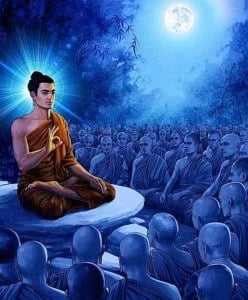
The reason why the Buddha does not talk much about God, especially in Pali Sutta, is simply that belief in God is not necessary to achieve enlightenment. It should be noted that he doesn’t confirm or reject this belief, but merely puts it aside.
As Barbara O’Brien states:
“Buddhism is not about either believing or not believing in God or gods. Rather, the historical Buddha taught that believing in gods was not useful for those seeking to realize enlightenment. In other words, God is unnecessary in Buddhism, as this is a practical religion and philosophy that emphasizes practical results over faith in beliefs or deities.” [5]
The Dalai Lama in an article on his website comparing the doctrines of theistic religions says the same thing, that Buddhism along with the contemporary religion of Jainism does not focus on God:
https://googleads.g.doubleclick.net/pagead/ads?gdpr=0&client=ca-pub-3878543860036370&output=html&h=280&adk=1194935637&adf=1648363249&pi=t.aa~a.4194215718~i.55~rp.4&w=693&abgtt=6&fwrn=4&fwrnh=100&lmt=1747262247&num_ads=1&rafmt=1&armr=3&sem=mc&pwprc=5779492849&ad_type=text_image&format=693×280&url=https%3A%2F%2Fbuddhaweekly.com%2Fwhat-does-buddhism-say-about-the-idea-of-god-best-answer-its-complicated-are-buddhists-theists-atheists-or-non-theists-does-it-even-matter%2F&fwr=0&pra=3&rh=174&rw=693&rpe=1&resp_fmts=3&wgl=1&fa=27&uach=WyJXaW5kb3dzIiwiMTAuMC4wIiwieDg2IiwiIiwiMTM2LjAuMzI0MC42NCIsbnVsbCwwLG51bGwsIjY0IixbWyJDaHJvbWl1bSIsIjEzNi4wLjcxMDMuOTMiXSxbIk1pY3Jvc29mdCBFZGdlIiwiMTM2LjAuMzI0MC42NCJdLFsiTm90LkEvQnJhbmQiLCI5OS4wLjAuMCJdXSwwXQ..&dt=1747264340309&bpp=3&bdt=2738&idt=4&shv=r20250514&mjsv=m202505130101&ptt=9&saldr=aa&abxe=1&cookie=ID%3D84cb7bace18a5c16%3AT%3D1747264338%3ART%3D1747264338%3AS%3DALNI_MbOedNS7O0O_UmHIgu6lMGJ0xN8xw&gpic=UID%3D0000101fd1e10b2c%3AT%3D1747264338%3ART%3D1747264338%3AS%3DALNI_Mbfiq6m9P8T6FGwcGdpsf2F-oMTFw&eo_id_str=ID%3D876bb81eac7e08ff%3AT%3D1747264338%3ART%3D1747264338%3AS%3DAA-AfjbQGtsAag4w6BmcWB5h8x-W&prev_fmts=0x0%2C693x280%2C693x280%2C1537x752%2C1005x124%2C693x280&nras=7&correlator=4977450786059&frm=20&pv=1&u_tz=-300&u_his=3&u_h=900&u_w=1600&u_ah=860&u_aw=1600&u_cd=24&u_sd=1&dmc=8&adx=299&ady=5357&biw=1537&bih=752&scr_x=0&scr_y=2355&eid=31092192%2C31092369%2C95353387%2C95360815%2C31092448%2C95360957&oid=2&psts=AOrYGsng6KZ8VFObsAOGW8zCMDPE6br4BsDt_JdkthxucvfEPhuB9wf_p882szhl5_rDvdHYpHDnIitVZcBIwSN_jpPKsnktvkwhG7rB4sRAGn6oBrV8-A%2CAOrYGskMET0gTXRtnLbWvCdzqZAUTeF1viwfkbSUDyh2Br9z4shc71DGNATVMlIvRSxnOtIf14olCCcZWaW2sQfxQ19i2hTJ%2CAOrYGslf-5afXFJcp54gEgs05o51rnMbzN2AVMHxbEnsYiQnZ4KC8tT4TZKpWBkQFxf0pr0a6OEU0vqcYJLnHvLDNetZBnQ4%2CAOrYGslFVXLH83nEnaHeAf4BJclLa_e6hlbTjJknNF-yCPfwvmV62VobvQbzzaTzP2ahA80jEuwwBKx8LegeXKZq3mpdNrbs&pvsid=4013715863223452&tmod=475939233&wsm=1&uas=3&nvt=1&ref=https%3A%2F%2Fwww.bing.com%2F&fc=1408&brdim=0%2C0%2C0%2C0%2C1600%2C0%2C1600%2C860%2C1552%2C752&vis=1&rsz=%7C%7Cs%7C&abl=NS&cms=2&fu=128&bc=31&bz=1.03&td=1&tdf=2&psd=W251bGwsbnVsbCxudWxsLDNd&nt=1&pgls=CAEaBTYuOC4x&ifi=5&uci=a!5&btvi=5&fsb=1&dtd=M
“Then, around 2,600 years ago, Buddha and the Jain founder, Mahavira, came. Neither of them mentioned God but emphasized instead simply cause and effect. Thus, one category of Samkhya and both Jainism and Buddhism are non-theistic religions.” [6]
Too many questions: the parable of the handful of leaves
Does this mean Buddha didn’t have the answer to these metaphysical questions? In the Samyutta Nikaya he explains he knows much more than he is revealing, through the parable of a handful of leaves:
“…Then the Blessed One took up a few simsapa leaves in his hand and addressed the monks thus: “What do you think, Monks, which is more numerous: these few leaves that I have taken up in my hand or those in the grove overhead?”
“Venerable sir, the leaves that the Blessed One has taken up in his hand are few, but those in the grove overhead are numerous.”
https://googleads.g.doubleclick.net/pagead/ads?gdpr=0&client=ca-pub-3878543860036370&output=html&h=280&adk=1194935637&adf=2144520185&pi=t.aa~a.4194215718~i.66~rp.4&w=693&abgtt=6&fwrn=4&fwrnh=100&lmt=1747262247&num_ads=1&rafmt=1&armr=3&sem=mc&pwprc=5779492849&ad_type=text_image&format=693×280&url=https%3A%2F%2Fbuddhaweekly.com%2Fwhat-does-buddhism-say-about-the-idea-of-god-best-answer-its-complicated-are-buddhists-theists-atheists-or-non-theists-does-it-even-matter%2F&fwr=0&pra=3&rh=174&rw=693&rpe=1&resp_fmts=3&wgl=1&fa=27&uach=WyJXaW5kb3dzIiwiMTAuMC4wIiwieDg2IiwiIiwiMTM2LjAuMzI0MC42NCIsbnVsbCwwLG51bGwsIjY0IixbWyJDaHJvbWl1bSIsIjEzNi4wLjcxMDMuOTMiXSxbIk1pY3Jvc29mdCBFZGdlIiwiMTM2LjAuMzI0MC42NCJdLFsiTm90LkEvQnJhbmQiLCI5OS4wLjAuMCJdXSwwXQ..&dt=1747264340332&bpp=6&bdt=2760&idt=6&shv=r20250514&mjsv=m202505130101&ptt=9&saldr=aa&abxe=1&cookie=ID%3D84cb7bace18a5c16%3AT%3D1747264338%3ART%3D1747264338%3AS%3DALNI_MbOedNS7O0O_UmHIgu6lMGJ0xN8xw&gpic=UID%3D0000101fd1e10b2c%3AT%3D1747264338%3ART%3D1747264338%3AS%3DALNI_Mbfiq6m9P8T6FGwcGdpsf2F-oMTFw&eo_id_str=ID%3D876bb81eac7e08ff%3AT%3D1747264338%3ART%3D1747264338%3AS%3DAA-AfjbQGtsAag4w6BmcWB5h8x-W&prev_fmts=0x0%2C693x280%2C693x280%2C1537x752%2C1005x124%2C693x280%2C693x280&nras=8&correlator=4977450786059&frm=20&pv=1&u_tz=-300&u_his=3&u_h=900&u_w=1600&u_ah=860&u_aw=1600&u_cd=24&u_sd=1&dmc=8&adx=299&ady=6229&biw=1537&bih=752&scr_x=0&scr_y=3222&eid=31092192%2C31092369%2C95353387%2C95360815%2C31092448%2C95360957&oid=2&psts=AOrYGsng6KZ8VFObsAOGW8zCMDPE6br4BsDt_JdkthxucvfEPhuB9wf_p882szhl5_rDvdHYpHDnIitVZcBIwSN_jpPKsnktvkwhG7rB4sRAGn6oBrV8-A%2CAOrYGskMET0gTXRtnLbWvCdzqZAUTeF1viwfkbSUDyh2Br9z4shc71DGNATVMlIvRSxnOtIf14olCCcZWaW2sQfxQ19i2hTJ%2CAOrYGslf-5afXFJcp54gEgs05o51rnMbzN2AVMHxbEnsYiQnZ4KC8tT4TZKpWBkQFxf0pr0a6OEU0vqcYJLnHvLDNetZBnQ4%2CAOrYGslFVXLH83nEnaHeAf4BJclLa_e6hlbTjJknNF-yCPfwvmV62VobvQbzzaTzP2ahA80jEuwwBKx8LegeXKZq3mpdNrbs%2CAOrYGsmRkcXA_YWNeU_w8tXwk5gMj49_UrM3CP_d62PguZIFL8qGrz61Bai3li-Gr8-sfWWJti5iOeyUFkV1Rfkxq_rWmbRi&pvsid=4013715863223452&tmod=475939233&wsm=1&uas=3&nvt=1&ref=https%3A%2F%2Fwww.bing.com%2F&fc=1408&brdim=0%2C0%2C0%2C0%2C1600%2C0%2C1600%2C860%2C1552%2C752&vis=1&rsz=%7C%7Cs%7C&abl=NS&fu=128&bc=31&bz=1.03&td=1&tdf=2&psd=W251bGwsbnVsbCxudWxsLDNd&nt=1&pgls=CAEaBTYuOC4x&ifi=6&uci=a!6&btvi=6&fsb=1&dtd=M
“So too, Monks, the things I have directly known but have not taught you are numerous, while the things I have taught you are few. And why monks have, I not taught you those many things? Because they are without benefit, irrelevant to the fundamentals of spiritual life…” [7]
As Dr. Alexander Berzin writes, there were fourteen such metaphysical questions on which the Buddha maintained silence when he was asked about them, again neither confirming or denying them which included most of those asked by Malunkyaputra. [8]
Bramajala Sutta, the impermance of all, including gods
The Buddha mentions Brahma explicitly in the ‘Brahmajala Sutta’ and assigns him many characteristics that people would normally ascribe to ‘God’ as believers know him today:
“And then, monks, that being who first arose there thinks: “I am Brahma, the Great Brahma, the Conqueror, the Unconquered, the All-Seeing, the All-Powerful, the Lord, the Maker and Creator, Ruler, Appointer and Orderer, Father of All That Have Been and Shall Be. These beings were created by me. How so? Because I first had this thought: ‘Oh, if only some other beings would come here!’ That was my wish, and then these beings came into this existence!”
https://googleads.g.doubleclick.net/pagead/ads?gdpr=0&client=ca-pub-3878543860036370&output=html&h=280&adk=1194935637&adf=68240460&pi=t.aa~a.4194215718~i.79~rp.4&w=693&abgtt=6&fwrn=4&fwrnh=100&lmt=1747262247&num_ads=1&rafmt=1&armr=3&sem=mc&pwprc=5779492849&ad_type=text_image&format=693×280&url=https%3A%2F%2Fbuddhaweekly.com%2Fwhat-does-buddhism-say-about-the-idea-of-god-best-answer-its-complicated-are-buddhists-theists-atheists-or-non-theists-does-it-even-matter%2F&fwr=0&pra=3&rh=174&rw=693&rpe=1&resp_fmts=3&wgl=1&fa=27&uach=WyJXaW5kb3dzIiwiMTAuMC4wIiwieDg2IiwiIiwiMTM2LjAuMzI0MC42NCIsbnVsbCwwLG51bGwsIjY0IixbWyJDaHJvbWl1bSIsIjEzNi4wLjcxMDMuOTMiXSxbIk1pY3Jvc29mdCBFZGdlIiwiMTM2LjAuMzI0MC42NCJdLFsiTm90LkEvQnJhbmQiLCI5OS4wLjAuMCJdXSwwXQ..&dt=1747264340357&bpp=3&bdt=2785&idt=3&shv=r20250514&mjsv=m202505130101&ptt=9&saldr=aa&abxe=1&cookie=ID%3D84cb7bace18a5c16%3AT%3D1747264338%3ART%3D1747264338%3AS%3DALNI_MbOedNS7O0O_UmHIgu6lMGJ0xN8xw&gpic=UID%3D0000101fd1e10b2c%3AT%3D1747264338%3ART%3D1747264338%3AS%3DALNI_Mbfiq6m9P8T6FGwcGdpsf2F-oMTFw&eo_id_str=ID%3D876bb81eac7e08ff%3AT%3D1747264338%3ART%3D1747264338%3AS%3DAA-AfjbQGtsAag4w6BmcWB5h8x-W&prev_fmts=0x0%2C693x280%2C693x280%2C1537x752%2C1005x124%2C693x280%2C693x280%2C693x280&nras=9&correlator=4977450786059&frm=20&pv=1&u_tz=-300&u_his=3&u_h=900&u_w=1600&u_ah=860&u_aw=1600&u_cd=24&u_sd=1&dmc=8&adx=299&ady=7206&biw=1537&bih=752&scr_x=0&scr_y=4198&eid=31092192%2C31092369%2C95353387%2C95360815%2C31092448%2C95360957&oid=2&psts=AOrYGsng6KZ8VFObsAOGW8zCMDPE6br4BsDt_JdkthxucvfEPhuB9wf_p882szhl5_rDvdHYpHDnIitVZcBIwSN_jpPKsnktvkwhG7rB4sRAGn6oBrV8-A%2CAOrYGskMET0gTXRtnLbWvCdzqZAUTeF1viwfkbSUDyh2Br9z4shc71DGNATVMlIvRSxnOtIf14olCCcZWaW2sQfxQ19i2hTJ%2CAOrYGslf-5afXFJcp54gEgs05o51rnMbzN2AVMHxbEnsYiQnZ4KC8tT4TZKpWBkQFxf0pr0a6OEU0vqcYJLnHvLDNetZBnQ4%2CAOrYGslFVXLH83nEnaHeAf4BJclLa_e6hlbTjJknNF-yCPfwvmV62VobvQbzzaTzP2ahA80jEuwwBKx8LegeXKZq3mpdNrbs%2CAOrYGsmRkcXA_YWNeU_w8tXwk5gMj49_UrM3CP_d62PguZIFL8qGrz61Bai3li-Gr8-sfWWJti5iOeyUFkV1Rfkxq_rWmbRi%2CAOrYGsmajqlAHQrvnR_7SDm_Q3AtRnkVvjaLRnZjyqsFlYirWDJ6I1wN56FNfgQ07hTKZ7AJ_efL-PTxlNDsoZVmjNSG9PGk&pvsid=4013715863223452&tmod=475939233&wsm=1&uas=3&nvt=1&ref=https%3A%2F%2Fwww.bing.com%2F&fc=1408&brdim=0%2C0%2C0%2C0%2C1600%2C0%2C1600%2C860%2C1552%2C752&vis=1&rsz=%7C%7Cs%7C&abl=NS&fu=128&bc=31&bz=1.03&td=1&tdf=2&psd=W251bGwsbnVsbCxudWxsLDNd&nt=1&pgls=CAEaBTYuOC4x&ifi=7&uci=a!7&btvi=7&fsb=1&dtd=M
He goes onto to describe it as a wrong view that one should think that though Brahma is eternal, we whom he created and the conditions of the world are impermanent:
“That Brahma, … he made us, and he is permanent, stable, eternal, not subject to change, the same forever and ever. But we who were created by that Brahma, we are impermanent, unstable, short-lived, fated to fall away, and we have come to this world.’ This is the first case where-by some ascetics and Brahmins are partly Eternalists and partly Non-Eternalists.” [9]
Earlier in the sutta, the Buddha clarifies that the views of some Brahmins and ascetics who hold views that the self is ‘partly eternalists, partly not-eternalists’ which as we know is contradicted by the Buddhist doctrine of Anatta. He was condemning this idea as wrong. He didn’t say that believing in a creator was right or wrong, nor did he specifically address this point.
Buddha: neither accepted nor rejected God
Therefore, the Buddha’s view on the concept of God was neither to accept, nor reject the concept of a creator or creation. Even if he believed in these things himself, he viewed the answers to these questions as not necessary to achieving enlightenment. So, a Buddhist can believe in, and even worship a God, should they wish but enlightenment can only be achieved by one’s own effort, it is completely up to the individual.
However, atheism is also perfectly compatible with Buddhism too, and some Buddhist thinkers reject the concept of a creator based on Buddhist philosophy and doctrine. Dr. V.A. Gunasekara for example, says that the concept of a God is incompatible with the idea of the three marks of existence.
https://googleads.g.doubleclick.net/pagead/ads?gdpr=0&client=ca-pub-3878543860036370&output=html&h=280&adk=1194935637&adf=1389028006&pi=t.aa~a.4194215718~i.92~rp.4&w=693&abgtt=6&fwrn=4&fwrnh=100&lmt=1747262247&num_ads=1&rafmt=1&armr=3&sem=mc&pwprc=5779492849&ad_type=text_image&format=693×280&url=https%3A%2F%2Fbuddhaweekly.com%2Fwhat-does-buddhism-say-about-the-idea-of-god-best-answer-its-complicated-are-buddhists-theists-atheists-or-non-theists-does-it-even-matter%2F&fwr=0&pra=3&rh=174&rw=693&rpe=1&resp_fmts=3&wgl=1&fa=27&uach=WyJXaW5kb3dzIiwiMTAuMC4wIiwieDg2IiwiIiwiMTM2LjAuMzI0MC42NCIsbnVsbCwwLG51bGwsIjY0IixbWyJDaHJvbWl1bSIsIjEzNi4wLjcxMDMuOTMiXSxbIk1pY3Jvc29mdCBFZGdlIiwiMTM2LjAuMzI0MC42NCJdLFsiTm90LkEvQnJhbmQiLCI5OS4wLjAuMCJdXSwwXQ..&dt=1747264340381&bpp=4&bdt=2809&idt=4&shv=r20250514&mjsv=m202505130101&ptt=9&saldr=aa&abxe=1&cookie=ID%3D84cb7bace18a5c16%3AT%3D1747264338%3ART%3D1747264338%3AS%3DALNI_MbOedNS7O0O_UmHIgu6lMGJ0xN8xw&gpic=UID%3D0000101fd1e10b2c%3AT%3D1747264338%3ART%3D1747264338%3AS%3DALNI_Mbfiq6m9P8T6FGwcGdpsf2F-oMTFw&eo_id_str=ID%3D876bb81eac7e08ff%3AT%3D1747264338%3ART%3D1747264338%3AS%3DAA-AfjbQGtsAag4w6BmcWB5h8x-W&prev_fmts=0x0%2C693x280%2C693x280%2C1537x752%2C1005x124%2C693x280%2C693x280%2C693x280%2C693x280&nras=10&correlator=4977450786059&frm=20&pv=1&u_tz=-300&u_his=3&u_h=900&u_w=1600&u_ah=860&u_aw=1600&u_cd=24&u_sd=1&dmc=8&adx=299&ady=8326&biw=1537&bih=752&scr_x=0&scr_y=5322&eid=31092192%2C31092369%2C95353387%2C95360815%2C31092448%2C95360957&oid=2&psts=AOrYGsng6KZ8VFObsAOGW8zCMDPE6br4BsDt_JdkthxucvfEPhuB9wf_p882szhl5_rDvdHYpHDnIitVZcBIwSN_jpPKsnktvkwhG7rB4sRAGn6oBrV8-A%2CAOrYGskMET0gTXRtnLbWvCdzqZAUTeF1viwfkbSUDyh2Br9z4shc71DGNATVMlIvRSxnOtIf14olCCcZWaW2sQfxQ19i2hTJ%2CAOrYGslf-5afXFJcp54gEgs05o51rnMbzN2AVMHxbEnsYiQnZ4KC8tT4TZKpWBkQFxf0pr0a6OEU0vqcYJLnHvLDNetZBnQ4%2CAOrYGslFVXLH83nEnaHeAf4BJclLa_e6hlbTjJknNF-yCPfwvmV62VobvQbzzaTzP2ahA80jEuwwBKx8LegeXKZq3mpdNrbs%2CAOrYGsmRkcXA_YWNeU_w8tXwk5gMj49_UrM3CP_d62PguZIFL8qGrz61Bai3li-Gr8-sfWWJti5iOeyUFkV1Rfkxq_rWmbRi%2CAOrYGsmajqlAHQrvnR_7SDm_Q3AtRnkVvjaLRnZjyqsFlYirWDJ6I1wN56FNfgQ07hTKZ7AJ_efL-PTxlNDsoZVmjNSG9PGk%2CAOrYGslA_IyKsLpM2XSixgjSn2gtsfpgdVDFqtucSQmytkHXu7GhW4UKOtTstPd3CQNzaNWv4bF6Kff_PIxl1pVjbA74G5Tn&pvsid=4013715863223452&tmod=475939233&wsm=1&uas=3&nvt=1&ref=https%3A%2F%2Fwww.bing.com%2F&fc=1408&brdim=0%2C0%2C0%2C0%2C1600%2C0%2C1600%2C860%2C1552%2C752&vis=1&rsz=%7C%7Cs%7C&abl=NS&fu=128&bc=31&bz=1.03&td=1&tdf=2&psd=W251bGwsbnVsbCxudWxsLDNd&nt=1&pgls=CAEaBTYuOC4x&ifi=8&uci=a!8&btvi=8&fsb=1&dtd=M
“A fundamental Buddhist belief is that all phenomena without exemption (including all animate beings) have three essential characteristics. These are dukkha (explained above), anicca (impermanence), and anatta (insubstantiality, “no-soul”). The attributes of God are not consistent with these universal marks of existence. Thus God must be free from dukkha; he must be eternal (and hence not subject to anicca); finally, he must have a distinct, unchanging identity (and therefore lack the characteristic of anatta). [10]
The Venerable S Dhammika also categorically denies that Buddhism believes in a God for many reasons, including that it is based on fear and appealing to more traditional arguments such as lack of evidence. [11]
Nicholas Niusuwan, A Buddhist writer for HuffPost in addressing whether or not Buddhism is a Philosophy or Religion, says the following:
https://googleads.g.doubleclick.net/pagead/ads?gdpr=0&client=ca-pub-3878543860036370&output=html&h=280&adk=1194935637&adf=1755894005&pi=t.aa~a.4194215718~i.98~rp.4&w=693&abgtt=6&fwrn=4&fwrnh=100&lmt=1747262247&num_ads=1&rafmt=1&armr=3&sem=mc&pwprc=5779492849&ad_type=text_image&format=693×280&url=https%3A%2F%2Fbuddhaweekly.com%2Fwhat-does-buddhism-say-about-the-idea-of-god-best-answer-its-complicated-are-buddhists-theists-atheists-or-non-theists-does-it-even-matter%2F&fwr=0&pra=3&rh=174&rw=693&rpe=1&resp_fmts=3&wgl=1&fa=27&uach=WyJXaW5kb3dzIiwiMTAuMC4wIiwieDg2IiwiIiwiMTM2LjAuMzI0MC42NCIsbnVsbCwwLG51bGwsIjY0IixbWyJDaHJvbWl1bSIsIjEzNi4wLjcxMDMuOTMiXSxbIk1pY3Jvc29mdCBFZGdlIiwiMTM2LjAuMzI0MC42NCJdLFsiTm90LkEvQnJhbmQiLCI5OS4wLjAuMCJdXSwwXQ..&dt=1747264340408&bpp=4&bdt=2836&idt=4&shv=r20250514&mjsv=m202505130101&ptt=9&saldr=aa&abxe=1&cookie=ID%3D84cb7bace18a5c16%3AT%3D1747264338%3ART%3D1747264338%3AS%3DALNI_MbOedNS7O0O_UmHIgu6lMGJ0xN8xw&gpic=UID%3D0000101fd1e10b2c%3AT%3D1747264338%3ART%3D1747264338%3AS%3DALNI_Mbfiq6m9P8T6FGwcGdpsf2F-oMTFw&eo_id_str=ID%3D876bb81eac7e08ff%3AT%3D1747264338%3ART%3D1747264338%3AS%3DAA-AfjbQGtsAag4w6BmcWB5h8x-W&prev_fmts=0x0%2C693x280%2C693x280%2C1537x752%2C1005x124%2C693x280%2C693x280%2C693x280%2C693x280%2C693x280&nras=11&correlator=4977450786059&frm=20&pv=1&u_tz=-300&u_his=3&u_h=900&u_w=1600&u_ah=860&u_aw=1600&u_cd=24&u_sd=1&dmc=8&adx=299&ady=9221&biw=1537&bih=752&scr_x=0&scr_y=6215&eid=31092192%2C31092369%2C95353387%2C95360815%2C31092448%2C95360957&oid=2&psts=AOrYGsng6KZ8VFObsAOGW8zCMDPE6br4BsDt_JdkthxucvfEPhuB9wf_p882szhl5_rDvdHYpHDnIitVZcBIwSN_jpPKsnktvkwhG7rB4sRAGn6oBrV8-A%2CAOrYGskMET0gTXRtnLbWvCdzqZAUTeF1viwfkbSUDyh2Br9z4shc71DGNATVMlIvRSxnOtIf14olCCcZWaW2sQfxQ19i2hTJ%2CAOrYGslf-5afXFJcp54gEgs05o51rnMbzN2AVMHxbEnsYiQnZ4KC8tT4TZKpWBkQFxf0pr0a6OEU0vqcYJLnHvLDNetZBnQ4%2CAOrYGslFVXLH83nEnaHeAf4BJclLa_e6hlbTjJknNF-yCPfwvmV62VobvQbzzaTzP2ahA80jEuwwBKx8LegeXKZq3mpdNrbs%2CAOrYGsmRkcXA_YWNeU_w8tXwk5gMj49_UrM3CP_d62PguZIFL8qGrz61Bai3li-Gr8-sfWWJti5iOeyUFkV1Rfkxq_rWmbRi%2CAOrYGsmajqlAHQrvnR_7SDm_Q3AtRnkVvjaLRnZjyqsFlYirWDJ6I1wN56FNfgQ07hTKZ7AJ_efL-PTxlNDsoZVmjNSG9PGk%2CAOrYGslA_IyKsLpM2XSixgjSn2gtsfpgdVDFqtucSQmytkHXu7GhW4UKOtTstPd3CQNzaNWv4bF6Kff_PIxl1pVjbA74G5Tn%2CAOrYGslypyONOFToUciEtmcemz5geaOMxXT4Ce1b_ai-z3ysrE7HL3cut4k1fYqCrsmthGM2q0-jTfOR9zmYNHBWm1Etu8mE&pvsid=4013715863223452&tmod=475939233&wsm=1&uas=3&nvt=1&ref=https%3A%2F%2Fwww.bing.com%2F&fc=1408&brdim=0%2C0%2C0%2C0%2C1600%2C0%2C1600%2C860%2C1552%2C752&vis=1&rsz=%7C%7Cs%7C&abl=NS&fu=128&bc=31&bz=1.03&td=1&tdf=2&psd=W251bGwsbnVsbCxudWxsLDNd&nt=1&pgls=CAEaBTYuOC4x&ifi=9&uci=a!9&btvi=9&fsb=1&dtd=M
“Unless one defines religion as having a centralized belief system based on a god or set of gods, which isn’t the definition used by everybody, Buddhism does have religious aspects.” [12]
Barbara O’Brien says: “If atheism is the absence of belief in a God or gods, then many Buddhists are, indeed, atheists.” [13]
Scientific Buddhists and Athiest Buddhists
There appears to be plenty of room for atheistic or scientifically-minded Buddhists within Buddhism as well as theists and anything else too. However, there is also a middle ground approach that has not been considered yet. In her book ‘A History of God,’ Karen Armstrong states the following and quotes Edward Conze and his book ‘Buddhism: its essence and development’:
“Nirvana literally means ‘cooling off’ or ‘going out’ It is not merely a negative state, however, but plays a role in Buddhist life that is analogous to God. As Edward Conze explains in ‘Buddhism: Its Essence and Development’ Buddhists often use the same imagery as theists to describe Nirvana, the ultimate reality:
‘We are told that Nirvana is permanent, stable, imperishable, immovable, ageless, deathless, unborn, and unbecoming. That it is power, bliss and happiness, the secure refuge, the shelter, and the place of unassailable security: that it is the real truth and the supreme reality, that it is the good, the supreme goal, and the one and only consummation of our life. The eternal, hidden and incomprehensible peace.’
Some Buddhists might object to this comparison because they find the concept of ‘God’ too limiting to express their conception of ultimate reality…We could not define Nirvana because our words and concepts are tied to the world of sense and flux… When asked if a Buddha who had attained Nirvana lived after death, he dismissed the question as improper… the word ‘exist’ bore no relation to any state that we can understand. The Buddha was trying to show that language was not equipped to deal with a reality that lay beyond concepts and reason.” [14]
Maybe the whole issue should be seen in another way. As Karen says, maybe Buddhists and Theists are actually addressing the same reality in different terms. This reality is what Buddhists call ‘Nirvana’ and what followers of theistic religions call ‘God.’ Though this really is thought of very differently in each religion, it is still the same. Thinking along these lines can offer a great way to engage in interfaith dialogue with followers of other faiths and offers Buddhists a profound new way of looking at the Buddhist path that is defiantly food for thought.
To conclude then, As stated at the beginning of the article, in Buddhism, there is room for all types of views on the idea of God. One can be an Atheist Buddhist, Christian Buddhist, Scientific Buddhist or any other kind of Buddhist, one can even follow another faith and aspects of Buddhism at the same time. Buddhism neither confirms nor denies the idea of God and different interpretations of Buddhist scripture and philosophy can give a diverse and rich variety of views and ideas about God as hopefully shown successfully in this article. The discussion is an important one and one that maybe we should think about as Buddhists in today’s increasingly connected world.
Still, when somebody asks what Buddhists believe about God, maybe the best answer would be: “It’s complicated!”
NOTES
[1]Karen Armstrong ‘A History of God’ (William Heinemann Ltd: the UK, 1993. P. 43
[2]Eknath Easwaran (trans) ‘The Dhammapada’ (Nilgiri Press: California, United States, 2008) Pp. 169 and 177
[3Eknath Easwaran (trans) ‘The Dhammapada’ (Nilgiri Press: California, United States, 2008) P.189
[4]Eknath Easwaran (trans) ‘The Dhammapada’ (Nilgiri Press: California, United States, 2008) PP. 56-57
[5]Barbara O’Brien, ‘Atheism and Devotion in Buddhism’. At https://www.thoughtco.com/atheism-and-devotion-in-buddhism-449718 [Accessed 20th September 2018]
[6]Dalai Lama ‘The Relevance of Religion in Modern Times’ at https://www.dalailama.com/messages/religious-harmony-1/the-relevance-of-religion-in-modern-times [Accessed 20th September 2018]
[7]Bhikkhu Bodhi ‘In the Buddha’s Words: An Anthology of Discourses from the Pali Canon’ (Wisdom Publications: USA, 2005). P. 360
[8]Dr Alexander Berzin ‘The Fourteen Questions To Which Buddha Remained Silent’ at https://studybuddhism.com/en/advanced-studies/abhidharma-tenet-systems/time-the-universe/the-fourteen-questions-to-which-buddha-remained-silent [Accessed 20th September 2018]
[9]Wikipitaka ‘The Brahmajala Sutta’ at https://tipitaka.wikia.com/wiki/Brahmajala_Sutta [Accessed 20th September 2018]
[10]Dr V.A. Gunasekara ‘The Buddhist Attitude to God’ at https://www.budsas.org/ebud/ebdha068.htm [Accessed 20th September 2018]
[11] Ven S Dhammika ‘Buddhism and the God-Idea’ at https://www.buddhanet.net/e-learning/qanda03.htm [Accessed 20th September 2018]
[12] Nicholas Niusuwan ‘Is Buddhism a Philosophy or a Religion?’ at https://www.huffingtonpost.com/nicholas-liusuwan/is-buddhism-a-philosophy-_b_10176992.html [Accessed 20th September 2018]
[13]Barbara O’Brien, ‘Atheism and Devotion in Buddhism’. At https://www.thoughtco.com/atheism-and-devotion-in-buddhism-449718 [Accessed 20th September 2018]
[14]Karen Armstrong ‘A History of God’ (William Heinemann Ltd: UK, 1993. PP. 44-45 Quoting Edward Conze ‘Buddhism: Its essence and development (Oxford 1959), P.40
More articles by this author

Peacemaking Buddhism: importance of Ahimsa “Non-Harm” in Buddhism — “Nonviolence is the weapon of the strong.”

What does Buddhism say about the idea of God? Best answer: ‘it’s complicated.” Are Buddhists theists, atheists or non-theists? Does it even matter?

The Jataka Tales: Why they remain relevant for adults and children both; all of the Buddhist Teachings contained in stories
Search
Latest Features
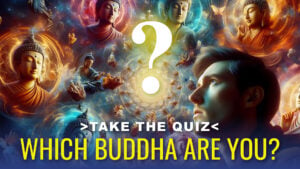
Yidam Enneagram: Which Buddha Are You? 15 Questions to Unlock Your Buddha Nature?
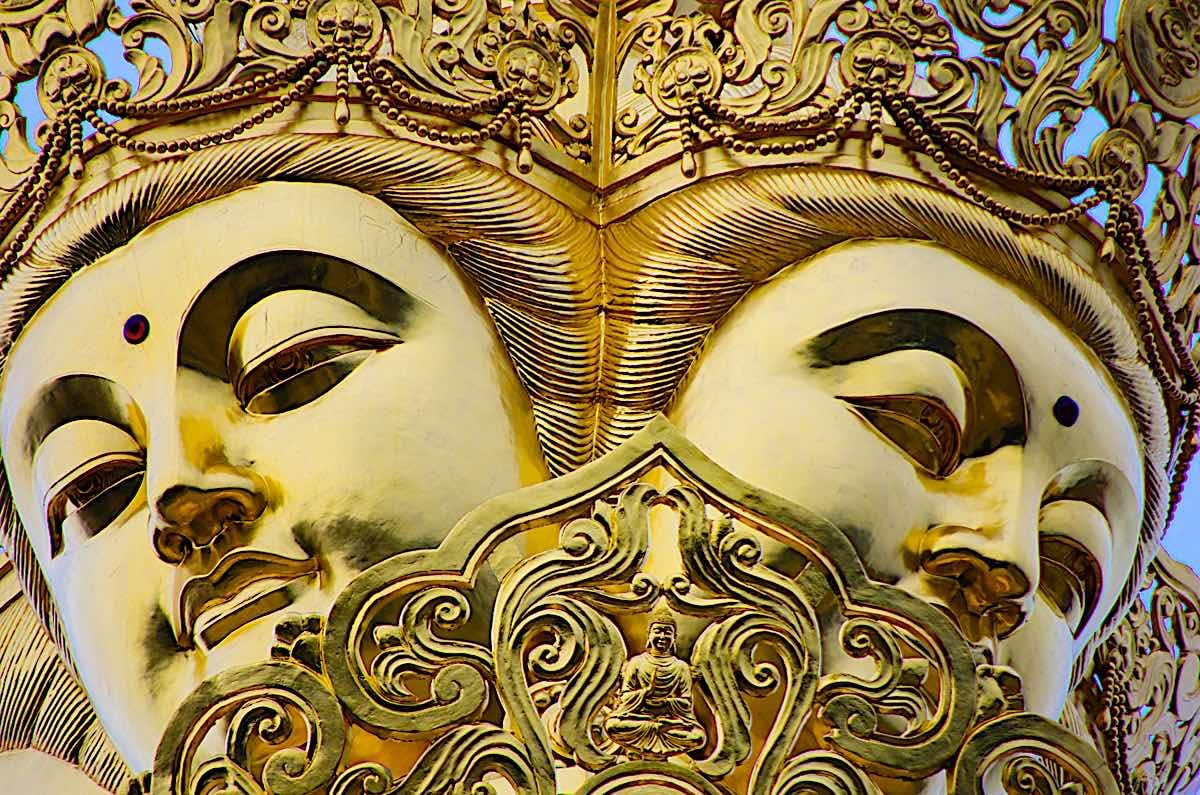
Samantabhadra’s The King of Prayers is the ultimate Buddhist practice how-to and itself a complete practice
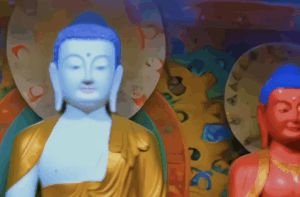
TRAILER: NEXT VIDEO! Yidam Enneagram: Which Buddha Are You? 15 Questions to Unlock Enlightenment
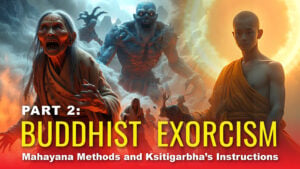
Video: Buddhist Exorcism: Kshitigarbha’s Instruction: Demon Hunters Part 2 with Dharanis and Mantras

Lama Zopa Rinpoche and other teachers recommend Kṣitigarbha mantra and practice for times of disaster, especially hurricane and earthquake, because of the great Bodhisattva’s vow
Please support the “Spread the Dharma” mission as one of our heroic Dharma Supporting Members, or with a one-time donation.
Please Help Support the “Spread the Dharma” Mission!

Be a part of the noble mission as a supporting member or a patron, or a volunteer contributor of content.
The power of Dharma to help sentient beings, in part, lies in ensuring access to Buddha’s precious Dharma — the mission of Buddha Weekly. We can’t do it without you!
A non-profit association since 2007, Buddha Weekly published many feature articles, videos, and, podcasts. Please consider supporting the mission to preserve and “Spread the Dharma.” Your support as either a patron or a supporting member helps defray the high costs of producing quality Dharma content. Thank you! Learn more here, or become one of our super karma heroes on Patreon.
https://www.youtube.com/subscribe_embed?usegapi=1&channelid=UCrX4D7DmFjgp4EJTPAqSOpA&layout=full&count=hidden&origin=https%3A%2F%2Fbuddhaweekly.com&gsrc=3p&ic=1&jsh=m%3B%2F_%2Fscs%2Fabc-static%2F_%2Fjs%2Fk%3Dgapi.lb.en.UrDN-rBnMgo.O%2Fd%3D1%2Frs%3DAHpOoo8Lt5m-Nn72_E0-4M58GbbhD_y7Yw%2Fm%3D__features__#_methods=onPlusOne%2C_ready%2C_close%2C_open%2C_resizeMe%2C_renderstart%2Concircled%2Cdrefresh%2Cerefresh%2Conload&id=I0_1747264339076&_gfid=I0_1747264339076&parent=https%3A%2F%2Fbuddhaweekly.com&pfname=&rpctoken=42390465
Lee Clarke | Contributing Author
Author | Buddha Weekly
“I’m a Buddhist, Quaker, Humanist, existentialist and pacifist. Budding professor of religion. Love many subjects, bilingual third year uni student.”SEND YOUR MESSAGE

Weekly Dharma by Email
Receive Buddha Weekly in-depth features by email.
Subscribe
You can unsubscribe anytime. For more details, review our Privacy Policy.


Visit Us At:
@BuddhaWeekly
#BuddhaWeekly
Did you miss this?

Video: Guanyin Avalokiteshvara Tara — Saving Us From Danger: The Burning House, the Jewel in the Robe
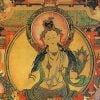
Vasudhara Dharani Sutra in English and Tibetan with the Dharani in Sanskrit and Tibetan.

Podcast: Green Tara Practice: Jason Espada recites the Song of Longing for Tara prayer with 21 Taras Praise in English

Maximize Merits in Buddhism: Solar and Lunar Eclipses Practices, a Comprehensive Guide to Practice

Archives
Archives Select Month May 2025 April 2025 March 2025 February 2025 January 2025 December 2024 November 2024 October 2024 September 2024 August 2024 July 2024 June 2024 May 2024 April 2024 March 2024 February 2024 January 2024 December 2023 November 2023 October 2023 September 2023 August 2023 July 2023 June 2023 May 2023 April 2023 March 2023 February 2023 January 2023 December 2022 November 2022 October 2022 September 2022 August 2022 July 2022 June 2022 May 2022 April 2022 March 2022 February 2022 January 2022 December 2021 November 2021 October 2021 September 2021 August 2021 July 2021 June 2021 May 2021 April 2021 March 2021 February 2021 January 2021 December 2020 November 2020 October 2020 September 2020 August 2020 July 2020 June 2020 May 2020 April 2020 March 2020 February 2020 January 2020 December 2019 November 2019 October 2019 September 2019 August 2019 July 2019 June 2019 May 2019 April 2019 March 2019 February 2019 January 2019 December 2018 November 2018 October 2018 September 2018 August 2018 July 2018 June 2018 April 2018 March 2018 February 2018 January 2018 December 2017 November 2017 October 2017 September 2017 August 2017 July 2017 June 2017 May 2017 April 2017 March 2017 February 2017 January 2017 December 2016 November 2016 October 2016 September 2016 August 2016 July 2016 June 2016 May 2016 April 2016 March 2016 February 2016 December 2015 October 2015 September 2015 August 2015 April 2015 March 2015 January 2015 November 2014 September 2014 January 2013 December 2012 November 2012 September 2012
Categories
Categories Select Category Albums Amitabha Puja Day Annual Grand Drubcho Art Gallery Avalokiteshvara Birthdays of Teachers Bodhisattva Annual Days Bodhisattvas Bon Book Excerpts and Reviews Buddha Buddha Annual Sacred Days Buddha Weekly Music Releases Buddhist Living Buddhist Practices Calendar Daka Tsog (Tsok) Dates Dakini Dakini Day and Tsog Dakini Wisdom Dalai Lama Deities Dharma Dharma Dates EPs Full Moon Garchen Rinpoche Guru Rinpoche Hayagriva I’m Thankful For In Buddha’s Words Jataka Tales Karma Koans and Riddles Kyabje Garchen Rinpoche Lama Tsongkhapa Lamrim / Ngondro Mahayana Mantra Mantra Videos Medicine Buddha Medicine Buddha Day Meditation Member Early Access Member Mp3 Download Member Videos Mindfulness New Moon News Our Readers Ask Padmasambhava Days PDFs Downloads Podcast Protection Practices Protector Puja Days Rebirth / Reincarnation Sangha Scientific Buddhist Shingon Singles Special Days Special Days Sutras & Sutta Symbols Tantra Tara Tara Puja Days Teacher Interviews Teacher Videos Teachers Teaching videos Teaching Videos Theravada Top 50 Features Vajrakilaya Vajrayana Video Teacher Advice Videos Weekly Features What the Buddhist Teachers Say What the Teachers Say What the Teachers Say Zen • Chan • Seon
© 2007-2025 Buddha Weekly. All Rights Reserved. Buddha Weekly is a trademark.
Buddha Weekly is a Non Profit Association of volunteers since 2007, committed to the Buddhist mission of “Spread the Dharma” — at NO cost to readers. About Buddha Weekly>>
Buddha Weekly and BuddhaWeekly.com are trademarks in use since 2007. Spread the Dharma is a trademark in use since 2021.
All Rights Reserved. Please feel free to excerpt stories with full credit and a link to Buddha Weekly. Please do not use more than an excerpt. Subject to terms of use and privacy statement. All information on this site, including but not limited to, text, graphics, images and other material contained on this website are for informational and educational purposes only.
The purpose of this website is to promote understanding and knowledge. It is not intended to be a substitute for professional advice, including medical advice, diagnosis, or treatment.

Buddha Weekly’s mission “Spread the Dharma” is carried out through Buddhist educational activities on this website, BuddhaWeekly.com, together with the Buddha Weekly Youtube Channel, the SpreadtheDharma podcasts, and related websites, social media channels, and activities.
Buddha Weekly does not recommend or endorse any information that may be mentioned on this website. Reliance on any information appearing on this website is solely at your own risk.
Amazon links are sometimes affiliate links with small commissions supporting the mission “Spread the Dharma” of Buddha Weekly.
Translate »
Complete your gift to make an impact

Donate







| https://www.youtube.com/subscribe_embed?action_card=1&channelid=UCrX4D7DmFjgp4EJTPAqSOpA&usegapi=1&usegapi=1&jsh=m%3B%2F_%2Fscs%2Fabc-static%2F_%2Fjs%2Fk%3Dgapi.lb.en.UrDN-rBnMgo.O%2Fd%3D1%2Frs%3DAHpOoo8Lt5m-Nn72_E0-4M58GbbhD_y7Yw%2Fm%3D__features__#id=I0_1747264340524&_gfid=I0_1747264340524&parent=https%3A%2F%2Fbuddhaweekly.com&pfname=&rpctoken=17249997 |  | |
 |   |  |
https://accounts.google.com/o/oauth2/postmessageRelay?parent=https%3A%2F%2Fbuddhaweekly.com&jsh=m%3B%2F_%2Fscs%2Fabc-static%2F_%2Fjs%2Fk%3Dgapi.lb.en.UrDN-rBnMgo.O%2Fd%3D1%2Frs%3DAHpOoo8Lt5m-Nn72_E0-4M58GbbhD_y7Yw%2Fm%3D__features__#rpctoken=1264603497&forcesecure=1
